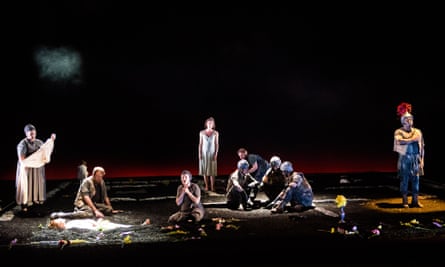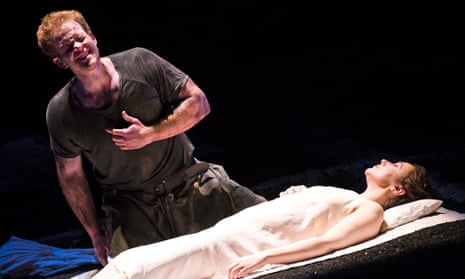A week after a graphic rape scene not envisaged by the original creators of William Tell provoked furious protests at the Royal Opera House, a work whose central dramatic event is a rape that is invariably presented visually opens at Glyndebourne.
Benjamin Britten’s first chamber opera, which had its world premiere at the Sussex opera house in 1946, now reappears at the festival proper following its belated addition to the repertory of the event’s touring wing in 2013. As when first staged two years ago, Fiona Shaw’s production is clear-sighted and non-sensational; nothing that the audience witnesses could ever fairly be condemned as gratuitous or offensive.
As Britten and his librettist Ronald Duncan intended, Shaw, together with her designers Michael Levine (sets) and Nicky Gillibrand (costumes), detaches the ancient world from the modern. The Male and Female Choruses, who describe and at times appear to motivate events, are presented as archaeologists of the period of the opera’s creation, whose own relationship is disturbed by the story they are – literally, at times – uncovering.
Their consciously Christian perspective also distances them from a narrative that takes place in a pagan context: the consequence of Lucretia’s rape by the jealous Tarquinius, spurred on by the politically motivated Junius, consists not only in her woefully misguided suicide but also in the revolt of the entire Roman population against its Etruscan overlords.
Shaw’s vision of the complexity of Britten’s characters and their interactions widens and deepens the scope of the opera, while her intense psychological probing rescues the piece from any danger of descending into a tract or morality play; she also underlines the opera’s close connection to the composer’s creative obsession with the destruction of innocence.

Equally, Leo Hussain’s observant conducting of a 13-piece ensemble made up of members of the London Philharmonic displays both the taut economy and the richness of atmosphere that help maintain the score’s potent musical tension.
Leading the cast is Christine Rice’s grandly sung Lucretia, noble in tone yet tragically vulnerable in her physical and emotional isolation; she’s finely supported by Louise Alder’s precise Lucia and Catherine Wyn-Rogers’ warmly maternal Bianca.
Duncan Rock’s forthright baritone conveys Tarquinius’s casual destructiveness, in vivid contrast to the caring nature of Collatinus as represented in Matthew Rose’s smooth bass, while Michael Sumuel’s hard-edged bass-baritone colours in the scheming nature of Junius. Allan Clayton and Kate Royal have the measure of the Male and Female Chorus, articulating their concerns with direct engagement.

Comments (…)
Sign in or create your Guardian account to join the discussion